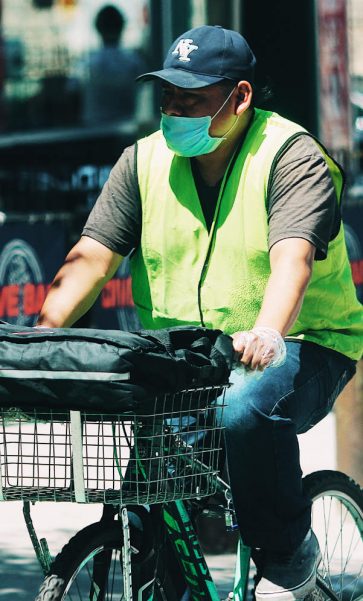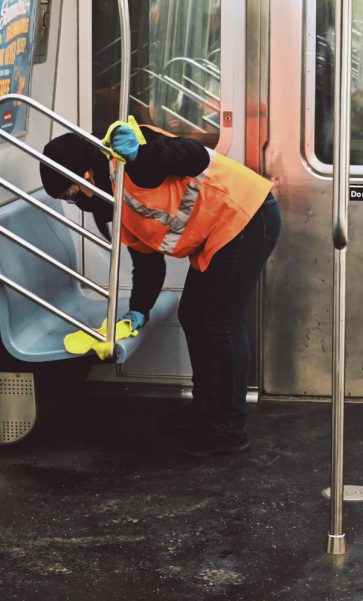It’s easy to feel, that we’re swirling in a coronavirus-induced vortex of helplessness. In many regions, COVID-19 case counts are increasing and in many others the health crisis seems to be stable or getting somewhat of a break. All health care workers continues to face impossible decisions. Many are sick and many others must comply with “stay at home” orders. Orders that anchor us in place as the needs of people around us keep growing.
So, obviously, our first instinct may be to hunker down and protect ourselves and those closest to us. But, as we have learned since the pandemic burst into our lives, to get through these times we must work together.
Empathy or Sympathy
Before understanding what helping others really means or try to talk about how helping others benefit us all specilaly during a time as the present, we believe its crucial to understand what empathy and means.
According to the Mirriam Webster Dictionary empathy (noun) means: the action of understanding, being aware of, being sensitive to, and vicariously experiencing the feelings, thoughts, and experience of another of either the past or present without having the feelings, thoughts, and experience fully communicated in an objectively explicit manner.
On the other hand, according to the Mirriam Webster Dictionary sympathy (noun) means: an affinity, association, or relationship between persons or things wherein whatever affects one similarly affects the other.
There is a major difference between having sympathy for someone and being empathic.
the first thing is to note that both are ways we respond to the suffering of people around us. However there’s a crucial difference: Sympathy is acknowledging someone else’s pain, but empathy is choosing to feel the pain with them.

Now that we have established the difference we can say that since we are living in a pandemic infested world (2020) both this terms have become more relevant than ever.
You can be empathic by being aware of other people’s needs, and being kind to others and yourself.
You can feel sympathy for someone’s situation and still remain unmoved. Sympathy is being aware of and sensitive to the needs and suffering of others. It’s being able to recognise the reality of a tough situation. A key elements is that even if you are sad, you still have an emotional boundary around yourself to keep from feeling what the sufferer is feeling.
Both manners of expressing and communicating are not easy to achieve. It is a fact that some people are more empathic than others. So, there are plenty of things that you can do to cultivate your own empathy skills.
In a time when people are practicing social distancing, self-isolation, and quarantine, it’s too easy to focus solely on yourself or your family unit.
So while you may be keeping your physical distance from others to prevent the spread of the virus, it doesn’t mean you need to be emotionally distant.
Sympathy can be helpful, as a matter of fact. It allows us to learn about the oppression, pain and tragedy surrounding us and then make decisions about how we can intentionally influence our community.
Both sympathy and empathy are important skills and are helpful in different contexts. However, empathy is a must-have for relationships because empathy fuels connection. It’s not enough for the people we care about to acknowledge our experiences. It’s not enough that people know about us.
Helping during the pandemic
The truth is that in helping other people get through this crisis, you can help yourself in equal measure.

In light of the continued spread of coronavirus, many people feel afraid right now.
Venues are cancelling large public events, stores can’t keep shelves stocked, and most officials are stressing the importance of social distancing.
However, some people must still head to work while they have no one helping them with childcare. Others, like the elderly, just feel lonely.
so, lending a helping hand during this pandemic crisis is necessary.
The fact of the matter is that, this global pandemic is affecting all of us in one way or another. There isn’t one single person that has nit be touched by it in some way or another.
Therefore, there are many ways to reach out to others.
Be aware, kind and considerate
First of all, we should consider some of the ways that the pandemic has affected our life. Are you working from home or on paid leave? Are your kids out due to school closures? Do you have plenty of food in your pantry and freezer?
Many have lost their jobs and are out of work while others have no choice but to continue working. Some people are worried about how to find childcare, others are struggling to find or pay for basic necessities.
This situations are being experienced by different people in different places around the globe. And it’s OK if you aren’t managing to do it all, if you feel like crumbling, if home and family routines have changed.
The changes brought upon us by the pandemic have taken place so suddenly that it has increased our stress, anxiety, and fear levels and, everyone deals with them differently.
We all have our own anxieties, but that doesn’t mean we should lose our kindness in the face of a crisis.
Sometimes we may be quick to criticise others without making the effort to understand how their situation and experiences are impacting their choices. Try to remember that everyone copes differently.

Supporting kids
Just as this situation is challenging for parents, it’s scary and confusing for kids.
Believe it or not, children became upset by school closures or missed time with friends. They also became anxious about what the pandemic means for their families.
Since we live in a world where news is at the tipo of our fingers, kids are exposed to it. So, limiting the news input is necessary, also being thoughtful about when and how you discuss the situation and your own feelings.
If you aren’t sure what a child needs, start by asking questions and listening. Assure them that the adults in their lives are working hard to keep everyone healthy. Finally, helping them feel in control by explaining the concrete steps they can take to protect themselves and others, goes a long way.
Supporting someone who’s lost a loved one to COVID-19
As the coronavirus continues to spread, the experience of losing a loved one to this disease is sadly becoming more common.

Physical distancing has also made grieving harder.
The pain of losing a loved one is compounded by being unable to gather with relatives.
If you have a friend or family member who is grieving a recent loss, the first and most important thing you can do is to reach out and let them know you’ll be there for them no matter what.
When offering support, be aware that this is a unique and extremely difficult time to be grieving.
The pandemic has impacted almost everyone in some way.
People who are dealing with a specific loss might feel that their grief is getting buried in the larger narrative.
Supporting those who keep us safe
Something that we all have seen, is that we all should be thankful for first responders and frontline workers.

Doctors, nurses, first responders, grocery clerks, gas station attendants, postal workers are risking their own health to keep their communities safe and functioning, and they need all the support we can provide right now.
To help them keep safe we can do several things.
Avoiding unnecessary errands (including nonessential home deliveries), rescheduling routine visits or doing online consults with doctors. or moving them to phone or video consultations.
Those same workers are often left unprotected by governments and systems that have failed to supply them with enough personal protective equipment, supplies, and resources to do their jobs.
The pandemic has highlighted how much society depends upon essential workers.
Concluding
If there is one common thread, it’s our deep desire to help and support others, be they family members, members of our community, or fellow humans across the globe.
For most (if not all) of us, the coronavirus feels uncertain and scary. But in spite of those feelings, many of us have still been moved to ask, “How can I help?”
The coronavirus (COVID-19) pandemic has led to sweeping changes and disruptions in nearly every aspect of daily life. With mandates and guidelines changing all the time, it’s easy to feel overwhelmed by our own anxieties. It is important to practice empathy during this time, not only for others but for yourself as well.


